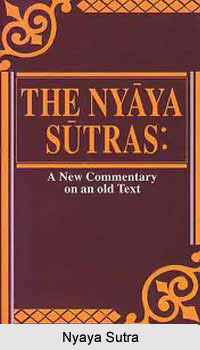 Rationality in Nyaya Sutra deals with such themes as the procedures for properly conducting debates, the nature of good argument, and the analysis of perception, inference and testimony in so far as they are sources of knowledge. There is a detailed account of the causal structure of the mind and the nature of its operation. Certain metaphysical questions are addressed, notably the reality of wholes, atoms and universals. At the beginning of his commentary on this remarkable work Vatsyayana Paksilasvamin (400 AD) wonders what it is that makes the Nyaya system distinctive. He states "Nyaya is the examination of things with the help of methods of knowing (pramana). It is and inference supported by observation and authority. This is called a critical proof (anviksa). A critical proof is the proof of things desired, supported by observation and authority. The discipline of critical inquiry is the one which pertains to it, and is also called the science of Nyaya or the writings on nyaya.
Rationality in Nyaya Sutra deals with such themes as the procedures for properly conducting debates, the nature of good argument, and the analysis of perception, inference and testimony in so far as they are sources of knowledge. There is a detailed account of the causal structure of the mind and the nature of its operation. Certain metaphysical questions are addressed, notably the reality of wholes, atoms and universals. At the beginning of his commentary on this remarkable work Vatsyayana Paksilasvamin (400 AD) wonders what it is that makes the Nyaya system distinctive. He states "Nyaya is the examination of things with the help of methods of knowing (pramana). It is and inference supported by observation and authority. This is called a critical proof (anviksa). A critical proof is the proof of things desired, supported by observation and authority. The discipline of critical inquiry is the one which pertains to it, and is also called the science of Nyaya or the writings on nyaya.
Vatsyayana agrees with Kautilya that the study of critical inquiry is one of the four branches of study, but he insists that it has its own procedures or methodology. He claims that if critical inquiry did not have its own procedures then it would merely be a study of the soul`s progress, like an Upanishad. Reasoned inquiry and scriptural studies are claimed to have the same eventual goal or purpose; where they differ is in method. That marks a departure from Kautilya`s purely instrumental conception of rationality, in which the use of reason could equally well serve any end. Vatsyayana claims that there can be rational goals, as well as rational means, and so to distance the Nyaya system from the free-thinkers in the epics.
According to Vatsyayana, reason can be used in one of the three ways. One may employ it in a good and proper way, as one does when one`s goal is to ascertain the truth of the matter. One may employ it in a bad or improper way, as when one`s goal is to defend one`s position at all costs, using any intellectual tricks one can think of. Finally, one might employ reason in a negative and destructive way. Here one has no goal other than to undermine one`s opponent. He further claims indeed that to use reason in this way is virtually self-defeating. Vatsyayana`s point is that someone who presents an argument against a thesis has at least that refutation as their goal, and so commits himself to the machinery of critical examination. He also states that the aimless use of reason is not just pernicious, rather it is self-defeating.
The salient point here is that reason must have a purpose, and the question is what that purpose should be. Vatsyayana argues that a goal is a rational one if it is the rational means to some further goal. And he claims that whatever one`s eventual goal is the rational way to achieve it is through the acquisition of knowledge that is knowledge about one`s goal and how it might be achieved. So the acquisition of knowledge is always a rational goal. Indeed it is the rational goal par excellence, for knowledge is instrumental in the rational pursuit of any other goal.
Since there is success in one`s activities when the awareness of one`s object is produced by an accredited method of knowing, the method of knowing is connected with the object. Without a method of knowing, there is no awareness of the object. Without an awareness of the object, there is no success in one`s activities. But the knower, having grasped the object in thought by some suitable method, either desires it or wants to avoid it. Success is the coming together of that activity with its reward. Desiring the object, or wanting to avoid it, one either makes an effort to obtain it or else to avoid it. One`s object is the satisfaction one feels and the cause of that contentment, or the disdain and the cause of that disdain.
Kautilya said that the study of critical inquiry is the study of the notion of investigating with reasons. The highest goal in life is reached through knowledge about the nature of knowable, methods of knowing, doubt, purpose, observational data, and doctrinal bases, the parts of a demonstration, suppositional reasoning, final decision, truth-directed debate, victory-directed debate, destructive debate, sophistic rejoinders, tricks, false reasons, and defeat situations. This philosophical text also mentions that an inquiry must have a purpose. The assumption is that any form of rational behaviour must have some motivating purpose, the point for which one wishes to resolve the doubt. While it is plausible that there is a dependency between the degree of success or failure of one`s plans and the extent of falsity in one`s beliefs, it is less easy to see that the dependency is mediated by the moral value of one`s actions.












